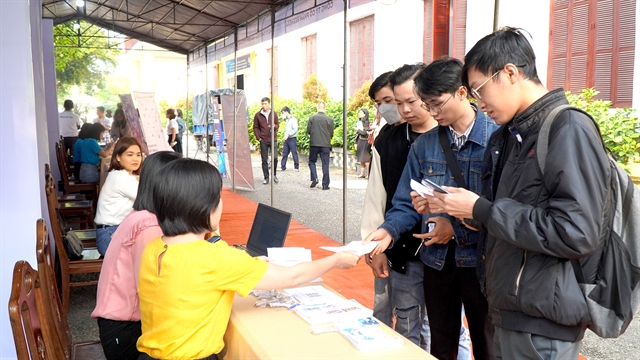 Society
Society

 |
| Students attend a job fair in the central province of Thừa Thiên-Huế . — VNA/VNS Photo Tường Vi |
HÀ NỘI — Hoàng Thái Hà graduated with an excellence from the Literature Education Faculty at the Hà Nội National University of Education last year, and now she is working as a teacher at a private education centre.
The 23-year-old, said that at present she did not want to work in state schools.
In Hà’s opinion, graduates like her rarely choose state agencies because of low salaries.
“In state organisations, monthly salary for new graduates is quite low, making it difficult to meet spending needs without working overtime or doing extra jobs,” she said.
Đặng Văn Kiên, 23, is also a graduate of the University of Social Sciences and Humanities at Hà Nội National University.
He missed a recruitment examination for state employees because the procedures required a lot of papers and certificates. He did not have enough time to prepare.
Kiên is now working at a private enterprise.
With his major in journalism and communication, Kiên said that knowledge at school was not enough. The more important thing for a graduate is to have more practical experience and working environment at a private enterprise helps him a lot.
“There are preferential policies for excellent graduates like me, however, it takes a long time to complete a set of documents that not everyone has conditions to prepare within a specified time limit,” said Kiên.
“Not to mention, after the application round, candidates must do one more exam and need time to revise for the exam. If applying to a private enterprise, graduates just need to send a set of documents and come for an interview."
Kiên hopes that state agencies would increase salaries and improve active working conditions to attract qualified graduates.
At present, it is difficult to update information on admission policies for excellent graduates. Materials to revise for enrolment exams are also difficult to find. Many graduates, despite their desires, do not fully understand the attraction policies, admissions process, and exam content.
Finding solutions
At the national workshop on policies to attract, train and foster scientific and technological intellectual staff held at the end of last month, associate professor Vũ Hải Quân, director of the HCM City National University, said that a survey on nearly 20,000 students of the university showed that only 10.21 per cent want to work for state agencies.
The rate is quite low and many people wonder why excellent students rarely choose state organisations after graduation.
Ngô Hồng Điệp, deputy principal of the Thủ Dầu Một University, told Việt Nam Education e-magazine that state organisations enroll very few new employees annually. It was so difficult for new graduates to enter.
Salaries in state agencies are regulated in legal documents. For many graduates, it is too little to meet their spending needs in life, especially those who live in big cities, which have higher costs of living than other localities.
Opportunities for advancement in state agencies need to be considered in a long process. Even if a graduate has excellent grades, it still needs a long time to have the opportunity to advance.
It can be easily seen that income in private enterprises was higher than in state agencies. Excellent graduates even can negotiate with their employer about their desired salary and they will start working after both reach agreement, said Điệp.
Young people often want to try out different environments to gain more experience. Not to mention, some excellent learners have start-up ideas and want to go through many jobs to learn and gain practical experience.
Working in private enterprises will meet these requirements more favourably.
Điệp said: “I hope that ministries will create changes and improve policies to attract excellent graduates to work in state agencies.
“It is necessary to raise salary policy so that they can live by their profession and create a favourable promotion environment based on their contribution and ability.”
Điệp added that every year, about 20-25 per cent of students at the Thủ Dầu Một University graduate with excellent grades.
The university established an Enterprise cooperation and Entrepreneurship Centre, creating job fairs to connect with agencies and businesses to support students in finding suitable jobs after graduation. — VNS




